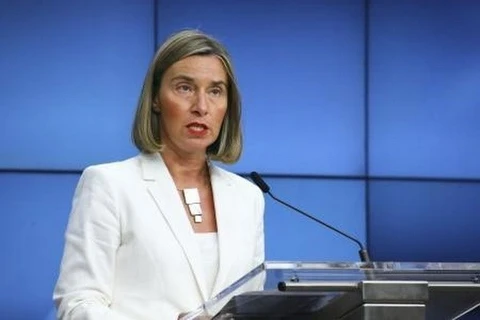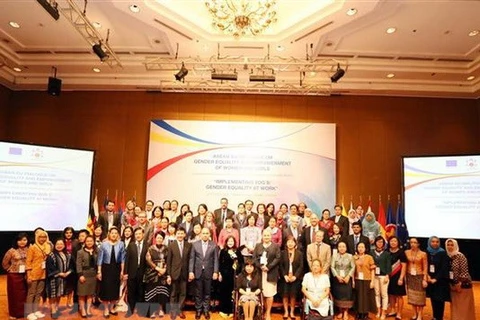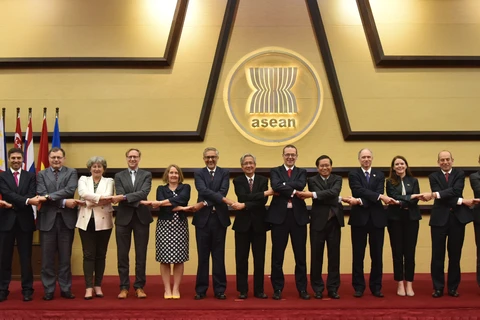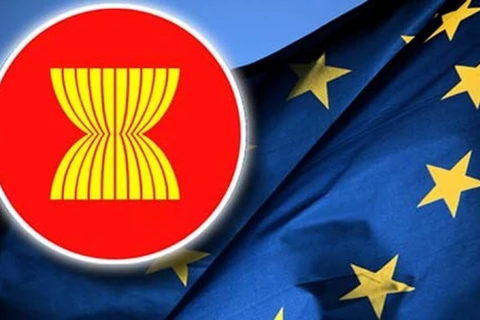 Officials pose for a photo at the 22nd ASEAN-EU Ministerial Meeting in Brussels on January 21 (Source: VNA)
Officials pose for a photo at the 22nd ASEAN-EU Ministerial Meeting in Brussels on January 21 (Source: VNA) Hanoi (VNA) – The Association of Southeast Asian Nations (ASEAN) and the European Union (EU) affirmed the commitment to enhancing bilateral comprehensive cooperation at the 22nd ASEAN-EU Ministerial Meeting in Brussels on January 21.
Officials of foreign affairs of the 10 ASEAN nations and 24 EU countries attended the meeting. Deputy Foreign Minister Nguyen Quoc Dung led the Vietnamese delegation to the event.
At the meeting, participants emphasised the two blocs’ special relations as “partners in integration”.
ASEAN valued the EU as a leading partner, especially in economy and development. The EU is currently the second biggest trade partner of ASEAN with bilateral trade reaching 261 billion USD in 2017, up 11.9 percent from the previous year. It is also the largest source of foreign investment of ASEAN when its direct investment here hit 25.4 billion USD in 2017, accounting for 18.6 percent of the total foreign direct investment in the region.
The EU also reiterated its support for ASEAN’s central role and that it considers ASEAN as an important partner sharing many interests and strategic visions.
Ministers recognised the progress in bilateral relations since the 21st ministerial meeting in 2016, particularly the success of the ASEAN-EU 40th Commemorative Summit in 2017 and the approval of the ASEAN-EU Plan of Action 2018-2022.
At the meeting, they agreed to bolster cooperation in the fields of shared concern and interest like economy-trade-investment, connectivity, climate change response, sustainable development, counter-terrorism, trans-national crime prevention, cyber security, and maritime security. The two sides also agreed to step up efforts towards an ASEAN-EU free trade agreement on the basis of the bilateral deals between the EU and ASEAN member countries.
They also reached a consensus in principle of upgrading ASEAN-EU relations to a strategic partnership, and adopted the joint statement of the meeting.
Regarding international and regional issues, the ministers exchanged views on complex and unpredictable developments of the global economic and political situation. They agreed to keep coordinating in the promotion of multilateralism and open, fair and rules-based multilateral trade systems, while working closely together to resolve global challenges, enhance dialogue, build trust and prevent conflicts.
As for the East Sea issue, participants continued to underline the importance of maintaining peace, stability, maritime security and safety, and freedom of navigation and overflight, and respecting the rule of law. They called on the sides relevant to make self-restraint, not threaten to use or use force, and settle disputes by peaceful means in line with international law, including the 1982 United Nations Convention on the Law of the Sea.
The countries voiced support for ASEAN and China’s efforts in effectively implementing the Declaration on the Conduct of Parties in the East Sea and working towards the early conclusion of a Code of Conduct (COC) in the waters.
Additionally, they welcomed the recent progress on the Korean Peninsula, affirming their support for and readiness to assist efforts towards sustainable peace and stability and complete denuclearisation on the peninsula. They also emphasised the continuation of the serious and full implementation of relevant resolutions of the UN Security Council.
On behalf of the ASEAN, Deputy Minister Dung delivered a speech on the cooperation priorities between the two sides in 2019. He proposed orientations and measures to intensify substantive cooperation in the areas matching the ASEAN’s demand and the EU’s strength such as climate change response, counter-terrorism, trans-national crime prevention, cyber security, border management, illegal fishing prevention and sustainable development.
He also reaffirmed the ASEAN’s principled stance on the East Sea issue and highlighted the strides in the building of the COC between ASEAN and China. The official added that the bloc supports the EU to contribute to its efforts to maintain regional peace, security and stability.
On the sidelines of the meeting, Dung had bilateral meetings with officials of Belgium, Romania, Greece, Hungary, the European Council and the European Commission to promote the signing and ratification of the EU-Vietnam Free Trade Agreement and the bilateral investment protection agreement, and discussed other issues of bilateral relations.-VNA
VNA
























